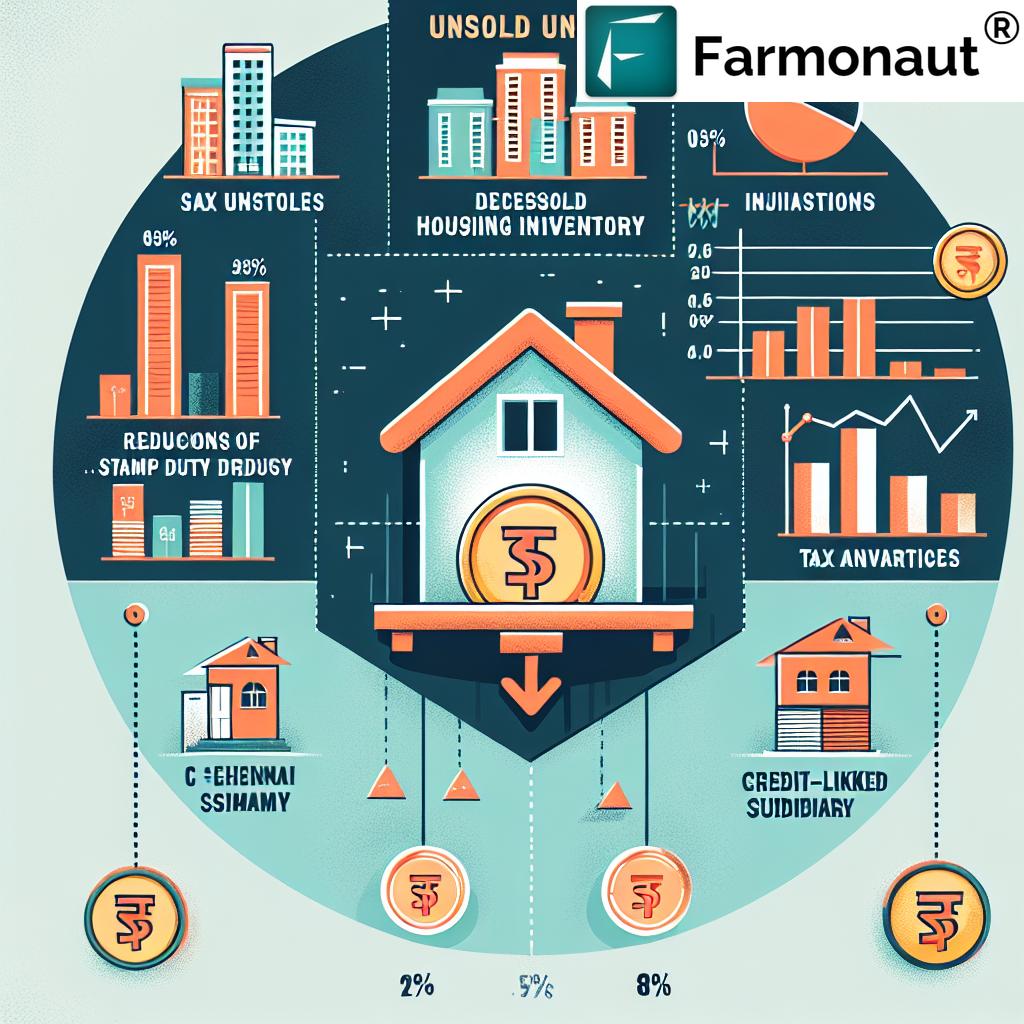India’s Real Estate Revolution: Budget 2025 Poised to Transform Affordable Housing and Boost Sector Growth

“India’s major cities face unsold housing inventory challenges, with potential government initiatives aiming to boost sector growth by 2025.”
As we approach the Union Budget 2025, India’s real estate sector stands at the cusp of a significant transformation. The upcoming budget is viewed as a potential turning point for the industry, which has been experiencing a notable upswing in housing sales across various cities. In this comprehensive analysis, we’ll delve into the current state of India’s real estate market, explore the anticipated budget initiatives, and discuss their potential impact on affordable housing and sector growth.
Current State of India’s Real Estate Market
The real estate sector in India has shown remarkable resilience and growth in recent years. According to the latest ANAROCK report, there has been a significant reduction in unsold housing inventory across major cities. Let’s break down the trends:
- Delhi-NCR: Unsold inventory has dramatically decreased from approximately 200,000 units at the end of Q1 2018 to around 86,420 units by the end of Q1 2024.
- Southern Cities: Bengaluru, Hyderabad, and Chennai reported a collective reduction in unsold stock by 11% over the same period.
- Bengaluru: Witnessed an impressive 50% reduction in unsold inventory.
- Hyderabad: Experienced a notable increase in inventory due to an influx of new supply.
These trends indicate a growing demand for housing, particularly in the affordable segment. However, the sector still faces challenges that the upcoming budget aims to address.
Anticipated Budget Initiatives for 2025
As the Modi government prepares for its second budget in its third term, real estate professionals express optimism about Finance Minister Nirmala Sitharaman’s approach towards the sector. Here are some key initiatives that industry experts anticipate:
1. Rationalization of Stamp Duties
Stamp duty has become a significant financial burden for homebuyers. Industry leaders, including Manoj Gaur, President of CREDAI NCR and CMD of Gaurs Group, emphasize the urgent need for stamp duty rationalization. This move could potentially reduce the overall cost of property acquisition, making housing more affordable for a larger segment of the population.
2. Revision of Affordability Criteria
The current definition of affordable housing, with a price cap of INR 40-45 lakh, is outdated considering the economic realities of 2025. Industry experts suggest focusing on carpet area specifications instead:
- 60 square meters in metropolitan areas
- 90 square meters in non-metro cities
This revision would align the affordability criteria with current market conditions and housing needs.
3. Enhanced Income Tax Deductions
To stimulate demand in the affordable housing segment, there are proposals to increase income tax deductions:
- Raise the deduction limit under Section 80(C) from INR 1.5 lakh to INR 5 lakh
- Enhance tax cuts on housing loan interest to a maximum of INR 5 lakh
Aman Gupta, Director of RPS Group, predicts that such measures could boost demand for affordable housing by at least 30% in the upcoming financial year.
4. Revision of Credit-Linked Subsidy Scheme (CLSS)
To further incentivize affordable housing within the INR 40 lakh segment, experts like Manoj Goyal of Forteasia Realty suggest raising the subsidy limits of the CLSS. This would make home ownership more accessible to a broader range of buyers.
5. Tax Exemptions for Affordable Housing Projects
Experts like Anurag Goel from Goel Ganga Developments advocate for the revival of the previous 100% tax exemption on affordable housing projects. This initiative could significantly boost the development of much-needed affordable housing units across the country.
6. GST Reduction on Construction Materials
Dr. Gautam Kanodia, Founder of KREEVA and Kanodia Group, proposes a reduction in GST on construction materials. This change could substantially lower project costs, enabling developers to initiate new projects more easily and potentially pass on the savings to homebuyers.
Impact on Affordable Housing and Sector Growth
The anticipated budget initiatives are expected to have a profound impact on India’s real estate sector, particularly in the affordable housing segment. Here’s how these measures could transform the landscape:
1. Increased Supply of Affordable Housing
By revising affordability criteria and offering tax incentives to developers, we can expect a surge in the supply of affordable housing units. This aligns with the government’s vision of “Housing for All” and addresses the current shortage in this segment.
2. Boost in Housing Demand
Enhanced tax deductions and lower stamp duties will make home ownership more attractive and financially viable for a larger section of the population. This could lead to a significant uptick in housing demand, particularly in the affordable and mid-segment categories.
3. Economic Stimulus
The real estate sector has a multiplier effect on the economy, influencing over 250 ancillary industries. A boost to this sector through budget initiatives will likely have a positive ripple effect across multiple industries, contributing to overall economic growth.
“Experts anticipate the 2025 Union Budget to introduce tax incentives and redefine affordability criteria, impacting India’s 1.3 billion population.”
4. Sustainable Development
Manik Malik, CFO of BPTP, emphasizes the need for policies fostering sustainable development and infrastructure improvement. The budget initiatives are expected to encourage more sustainable and environmentally friendly construction practices, aligning with global trends in real estate development.
5. Improved Access to Housing Finance
Revisions to the CLSS and potential collaborations with financial institutions could make housing loans more accessible and affordable. This would be particularly beneficial for first-time homebuyers and those in the lower-income segments.
| City Name | Current Unsold Inventory (Estimated units) | Projected Demand by 2025 (Estimated units) | Current Average Price per sq. ft. (in INR) | Projected Price Change by 2025 (%) | Potential Impact of Budget Initiatives |
|---|---|---|---|---|---|
| Mumbai | 120,000 | 180,000 | 15,000 | +8% | High |
| Delhi NCR | 86,420 | 130,000 | 6,500 | +5% | High |
| Bangalore | 70,000 | 110,000 | 7,000 | +10% | Medium |
| Chennai | 45,000 | 75,000 | 5,500 | +6% | Medium |
| Hyderabad | 55,000 | 90,000 | 6,000 | +12% | High |
| Pune | 40,000 | 65,000 | 5,800 | +7% | Medium |
Challenges and Considerations
While the anticipated budget initiatives promise significant growth, there are challenges that need to be addressed:
- Land Acquisition: The availability of suitable land for affordable housing projects remains a challenge, especially in urban areas.
- Infrastructure Development: Ensuring adequate infrastructure to support new housing developments is crucial for sustainable growth.
- Balancing Affordability and Quality: There’s a need to maintain construction quality while keeping costs low to ensure truly affordable housing.
- Regional Disparities: The impact of budget initiatives may vary across different regions, requiring tailored approaches for different cities and states.
The Role of Technology in Real Estate Growth
As we look towards the future of India’s real estate sector, it’s crucial to consider the role of technology in driving growth and efficiency. Companies like Farmonaut are at the forefront of this technological revolution, offering innovative solutions that can indirectly benefit the real estate sector.
While Farmonaut’s primary focus is on agricultural technology, its advanced satellite-based solutions and AI-driven insights have potential applications in urban planning and land use management. These technologies could assist in:
- Identifying suitable land for real estate development
- Assessing environmental impact of construction projects
- Monitoring urban sprawl and planning sustainable cities
For those interested in exploring how satellite technology can revolutionize land use, check out Farmonaut’s services:
Future Outlook and Conclusions
The Union Budget 2025 is poised to be a game-changer for India’s real estate sector, particularly in the affordable housing segment. By addressing key challenges and introducing supportive measures, the government aims to stimulate growth, increase housing supply, and make home ownership more accessible to a larger portion of the population.
Key takeaways include:
- A potential surge in affordable housing supply due to revised definitions and tax incentives
- Increased housing demand driven by enhanced tax benefits and stamp duty rationalization
- Focus on sustainable development and improved infrastructure
- Potential for significant economic growth due to the real estate sector’s multiplier effect
As we move towards 2025, the real estate sector in India stands on the brink of a new era. The anticipated budget initiatives, coupled with technological advancements and a focus on sustainability, promise to reshape the housing landscape, making it more inclusive, affordable, and growth-oriented.
FAQs
- Q: How will the budget initiatives impact first-time homebuyers?
A: First-time homebuyers are likely to benefit significantly from enhanced tax deductions, potentially lower stamp duties, and revised CLSS terms, making home ownership more accessible and affordable. - Q: What role will technology play in the real estate sector’s growth?
A: Technology will play a crucial role in improving efficiency, sustainability, and transparency in the real estate sector. From satellite-based land assessment to AI-driven property management, technological advancements will shape the future of real estate development and management. - Q: How will the revision of affordability criteria affect the market?
A: The revision is expected to increase the supply of affordable housing units by allowing developers to create larger, more diverse properties that still qualify as “affordable”. This could lead to a broader range of housing options for middle-income buyers. - Q: Will the budget initiatives address the issue of unsold inventory?
A: Yes, the combination of increased demand (due to tax benefits and easier financing) and revised affordability criteria is expected to help reduce unsold inventory, particularly in the affordable housing segment. - Q: How might these changes impact real estate prices?
A: While increased demand could put upward pressure on prices, the boost in supply and government incentives are expected to keep price increases moderate, especially in the affordable housing segment.

In conclusion, the Union Budget 2025 holds the potential to revolutionize India’s real estate sector, particularly in the realm of affordable housing. By addressing key challenges and introducing supportive measures, the government aims to stimulate growth, increase housing supply, and make home ownership more accessible to a larger portion of the population. As we look towards this exciting future, it’s clear that the real estate landscape in India is on the cusp of a transformative era, promising positive changes for developers, homebuyers, and the economy at large.
Earn With Farmonaut: Affiliate Program
Earn 20% recurring commission with Farmonaut’s affiliate program by sharing your promo code and helping farmers save 10%. Onboard 10 Elite farmers monthly to earn a minimum of $148,000 annually—start now and grow your income!
















